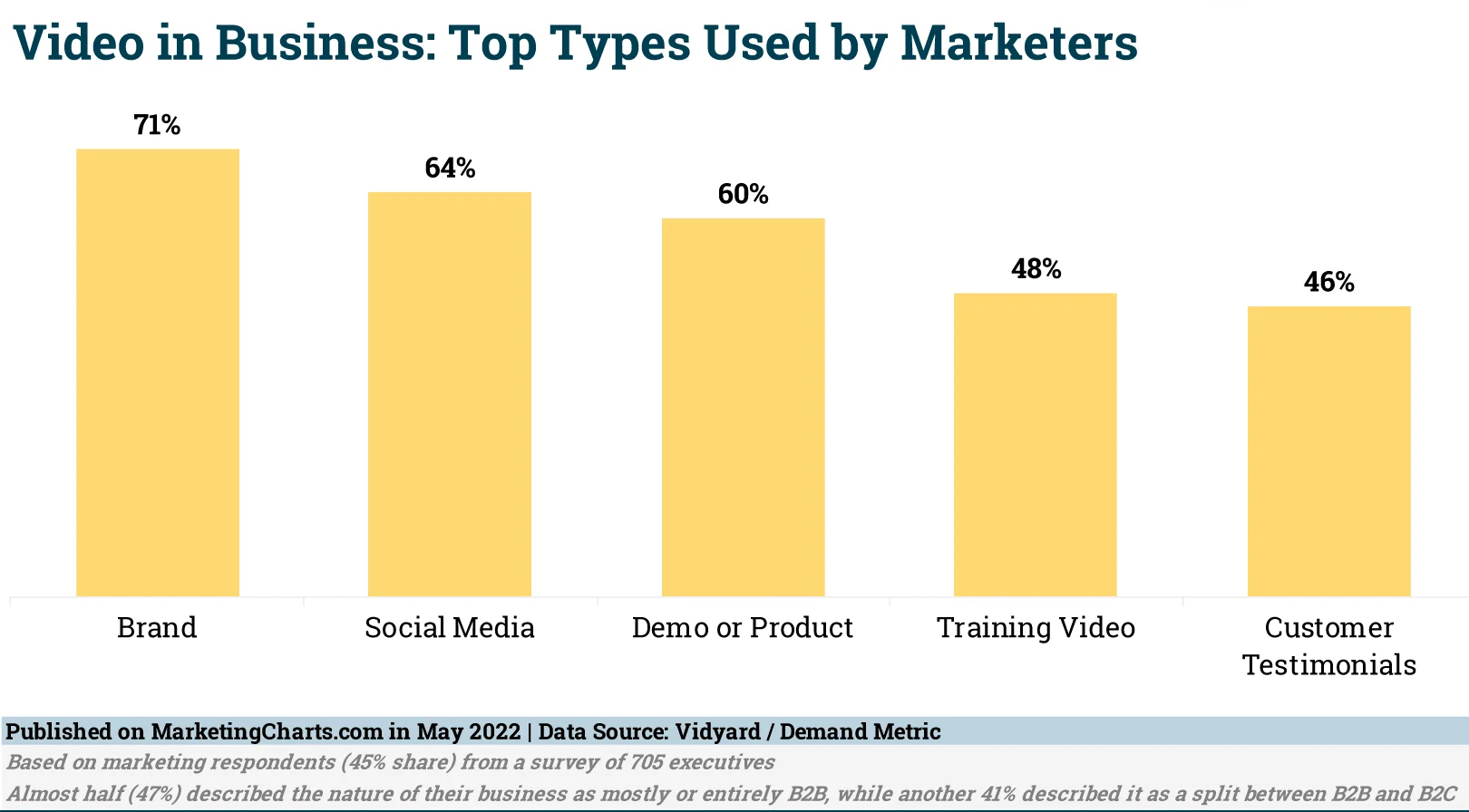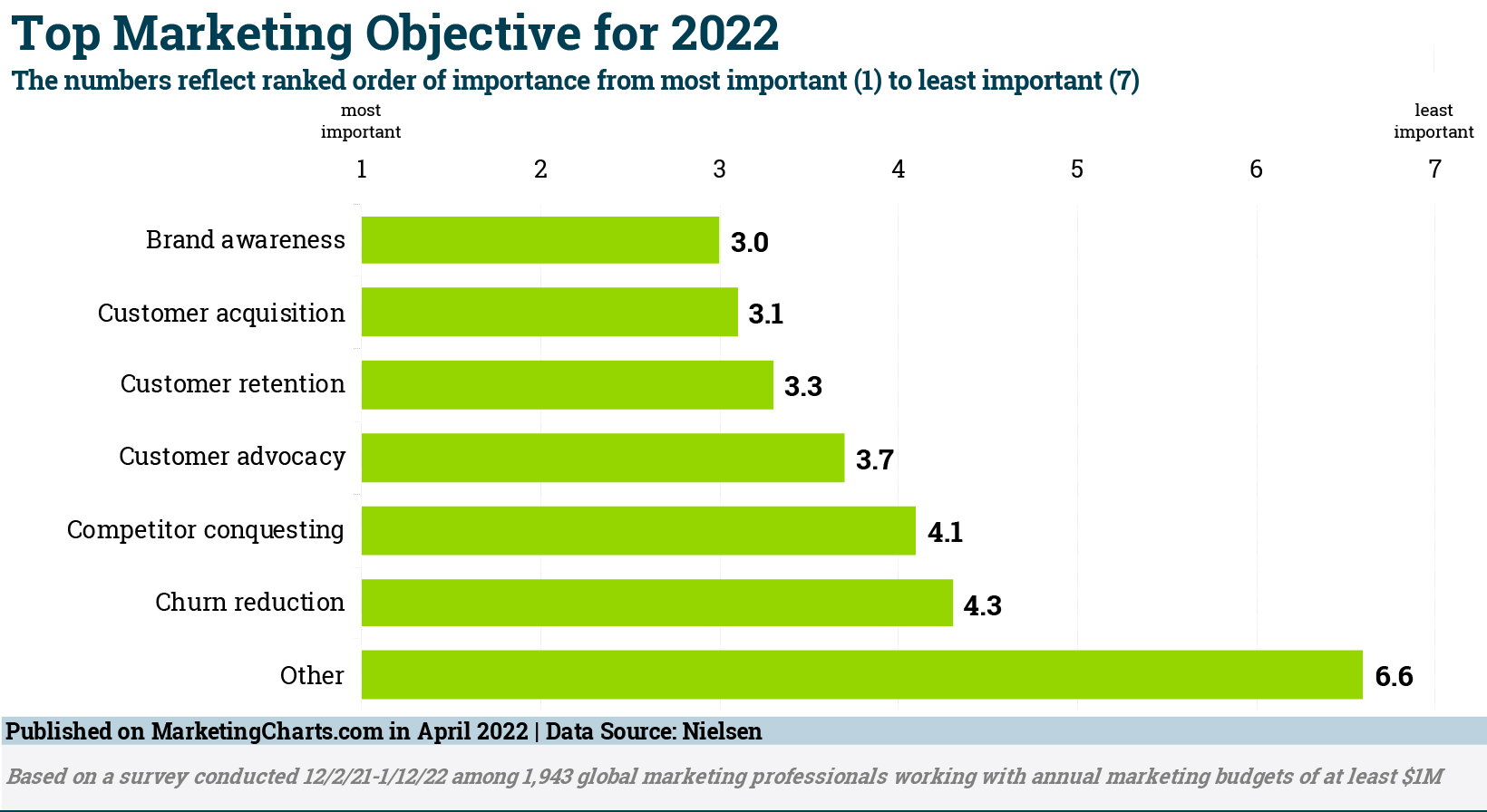![Most Widely Used Video Types Used by Marketers [Study]](https://bersondeanstevens.com/wp-content/uploads/2022/05/harrison-kugler-qNzLI82MAso-unsplash-1080x675.jpg)
Most Widely Used Video Types Used by Marketers [Study]
According to Vidyard and Demand Metric report, more than 8 in 10 marketing, sales, and customer experience executives say that video is becoming more important as a form of content in their organization

Overall Video Creation Increased 178% in 2021 Compared to 2020
Key Takeaways
1. Brand and Social Media Videos Are Widely Used by Marketers
The most common type of videos are brand videos (53%), followed by demo or product videos (51%), social media videos (48%), training videos (45%), and how-to videos (42%). The popularity of social media videos speaks to social’s presence as a leading distribution platform: 63% of respondents distribute videos on social media sites, equal with websites as the top area for posting videos.
80% of All Videos Created in 2021 Were User-Generated, Versus 60% in 2020
The top video types differ by role. For example, a large share of sales teams will invest in user-generated videos, while customer experience teams show a strong inclination to invest in how-to videos.
The Average Video Created in 2021 Was 9 Minutes and 58 Seconds Long
Among marketing respondents, the video types used by a majority are brand (71%), social media (64%), and demo or product (60%) videos, while close to half use training videos (48%) and customer testimonials (46%). Although how-to videos did not feature among the top 5 for marketers in this study, previous research indicates that they are often used by B2B content marketers, who find video to be among their most effective top-of-the-funnel demand generation tactics.
2. Half of The Marketers Say Video ROI is Improving
7 in 10 respondents across job roles said that video performs better than other content types they use or have used in producing their desired results, a figure 10 times higher than the share (7%) who say that video performs worse.
Additionally, two-thirds of respondents report that video’s ROI is either getting better (45%) or staying the same (21%), though 3 in 10 don’t know. Marketers are the most optimistic about video ROI, with about half (49%) saying that it is improving, and another fifth (21%) reporting steady results.
Prior research suggests that videos have performed better than other content types such as long articles, livestreaming content, and podcasts, though fewer content marketers in that study found video to be as effective for them as virtual events and research reports, among others.
3. Video Viewing Data Deemed Important for Lead Scoring and Nurturing
Three-quarters of sales respondents believe that it would be important for the sales team to access video viewing data to qualify leads, engage prospects, or influence specific deals. Marketers largely agree, with two-thirds recognizing the importance of such data to lead nurturing efforts.
Currently, roughly 1 in 5 (21%) respondents say that their sales team uses video viewing data to a great extent to qualify leads, engage prospects, or influence specific deals, while about one-third say the sales team does so to a moderate extent (34%) and one-quarter (26%) to a slight extent.
Integration of this data would help, yet remains in its infancy: only slightly more than 1 in 3 respondents (36%) say that they have integrated video viewing data into their marketing automation platform (MAP) and/or customer relationship management (CRM) system, although another half (49%) claim that they are planning to integrate this data.
4. Video Production Proves Difficult
While various teams within the organization are requesting and creating video content, marketing has the biggest role to play, and is the only team that a majority identified as both requesting (63%) and creating (65%) this form of content.
Although most medium- and large-sized companies use external resources to some degree to aid in their video creation efforts, only a minority of smaller companies do so.
This could prove problematic, as video production is a challenging affair. When asked which barriers or roadblocks respondents are facing in successfully leveraging video to help achieve business goals, the top 4 (equally cited) all involved production to some extent:
- Producing professional quality video that represents the brand well.
- Having a strategy to drive video production.
- Allocating staff time and resources for video production.
- Producing videos that engage.
No wonder content marketers identified video as the number one type of content they would create if more resources were available to them.
Nonetheless, a majority of respondents are very satisfied (7%) or satisfied (49%) with the results they’re getting from their video efforts, with satisfaction rates much higher (67%) among those who use advanced metrics.
With this in mind, it’s perhaps not surprising that video was mentioned as the top area of investment for B2B content marketers this year.
About the Data: The results are based on a survey of 705 executives across marketing (45% share), sales (25%), customer experience (12%), and other (18%) job roles. Almost half (47%) described the nature of their business as mostly or entirely B2B, while another 41% described it as a split between B2B and B2C.
Need assistance with your video marketing? Schedule a call or email Lori Berson at lberson@BersonDeanStevens.com.
BersonDeanStevens has been a recognized brand strategy and marketing leader for over 25 years, including over a decade in marketing and sales automation. We work in partnership with you to differentiate your brand and achieve your business goals. Client list.
![2022 Top Marketing Objectives [Report]](https://bersondeanstevens.com/wp-content/uploads/2022/05/Marketing-Objectives.jpg)
